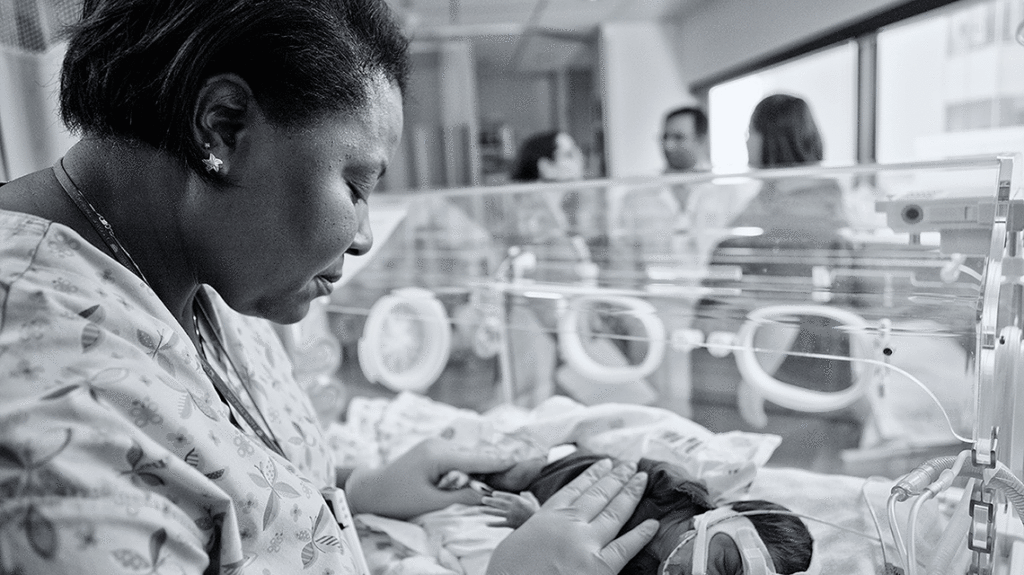What is the Association Between Kidney Injury and Fluid Balance in Premature Newborns?
What is the Association Between Kidney Injury and Fluid Balance in Premature Newborns? https://pediatricsnationwide.org/wp-content/uploads/2021/02/022812ds391HRBW_NICU-for-web-header-1024x575.gif 1024 575 Mary Bates, PhD Mary Bates, PhD https://secure.gravatar.com/avatar/c6233ca2b7754ab7c4c820e14eb518c8?s=96&d=mm&r=g- January 30, 2020
- Mary Bates, PhD

A positive fluid balance is associated with acute kidney injury and worse outcomes in a new study of premature infants.
According to new research, there is an association between fluid balance and outcomes in preterm newborns, with a negative fluid balance during the first week of life emerging as a potential therapeutic target.
Premature infants can experience multi-organ dysfunction, frequently including kidney dysfunction. The international Assessment of Worldwide Acute Kidney Injury Epidemiology in Neonates (AWAKEN) study showed that acute kidney injury occurs commonly in preterm newborns and is associated with increased mortality and length of stay. Kidney injury can also affect the function of other organs through its influence on fluid balance.
The AWAKEN study captured data on acute kidney injury, fluid balance, and the impact of other kidney-related risk factors on short-term outcomes in premature infants. Researchers from institutions including Nationwide Children’s Hospital used these data to investigate the changes in fluid balance in preterm newborns during the first week of life and investigate the association of fluid balance with acute kidney injury and an important short-term outcome, the need for mechanical ventilation at postnatal day 7.
“The incidence of kidney issues in this population is much higher than we appreciated,” says John Mahan, MD, professor of pediatrics in the Division of Nephrology at Nationwide Children’s and The Ohio State University College of Medicine. He is also director of the Nationwide Children’s Center for Faculty Development, program director of the Pediatric Nephrology Fellowship Program and one of the study’s authors. “The inability to excrete water is a significant problem in these small babies. When we looked over a large number of patients, we saw kidney involvement in many of them.”
Over half the newborns had weights above birth weight in the first postnatal week, indicating a positive fluid balance in that period. Those with a positive fluid balance at postnatal day 7 were more likely to require mechanical ventilation. In addition, fluid balance was associated with acute kidney injury.
Dr. Mahan says kidney issues in premature infants can go unappreciated unless one is regularly testing kidney function.
“Those early signs of kidney issues, like the inability to excrete water, are easy to miss and yet these early signs of kidney issues can lead to significant and long-term problems,” he says.
Elizabeth Bonachea, MD, the program director for the Neonatal-Perinatal Medicine Fellowship at Nationwide Children’s and another of the study’s authors, says that detecting kidney issues early is crucial.
“The next generation of studies will focus on prevention and early intervention,” she says. “We are now working on developing a standard approach to detection and diagnosis of kidney injury in these babies. Looking forward, these studies will inform the institution of appropriate interventions to prevent or minimize kidney injury in premature babies.”
Reference:
Selewski DT, Gist KM, Nathan AT, Goldstein SL, Boohaker LJ, Akcan-Arikan A, Bonachea EM, Hanna M, Joseph C, Mahan JD, Mammen C, Nada A, Reidy K, Staples A, Wintermark P, Griffin R, Askenazi DJ, Guillet R, Neonatal Kidney Collaborative. The impact of fluid balance on outcomes in premature neonates: a report from the AWAKEN study group. Pediatric Research. 2019 Sep 19. doi: 10.1038/s41390-019-0579-1. [Epub ahead of print]
Photo credit: Nationwide Children’s
About the author
Mary a freelance science writer and blogger based in Boston. Her favorite topics include biology, psychology, neuroscience, ecology, and animal behavior. She has a BA in Biology-Psychology with a minor in English from Skidmore College in Saratoga Springs, NY, and a PhD from Brown University, where she researched bat echolocation and bullfrog chorusing.
-
Mary Bates, PhDhttps://pediatricsnationwide.org/author/mary-bates-phd/December 27, 2016
-
Mary Bates, PhDhttps://pediatricsnationwide.org/author/mary-bates-phd/
-
Mary Bates, PhDhttps://pediatricsnationwide.org/author/mary-bates-phd/
-
Mary Bates, PhDhttps://pediatricsnationwide.org/author/mary-bates-phd/
- Posted In:
- In Brief






